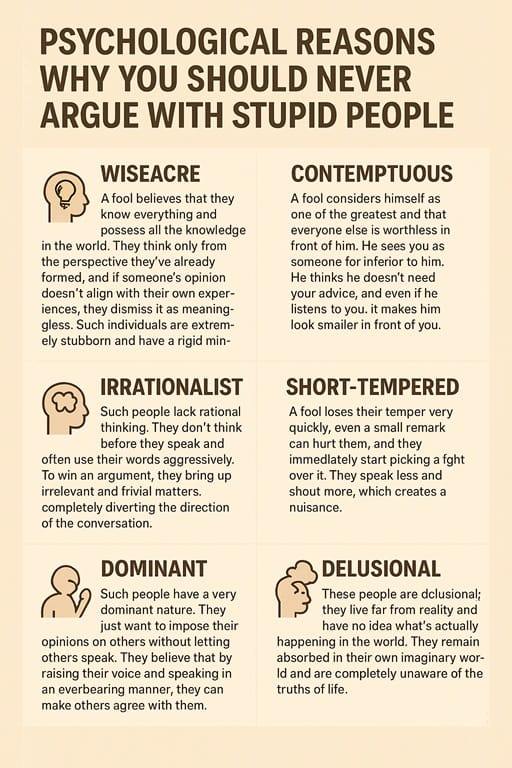Remember when American writer Mark Twain said, “Never argue with a fool, onlookers may not be able to tell the difference.” What was he trying to convey to people with this statement? He is simply saying that if you argue with a fool, idiot, or a stupid person, onlookers will perceive both of you as fools who are fighting pointlessly, even though you seem to be morally or logically correct.
It’s wise to understand that there is no point in arguing with a fool who lacks the sense to understand your point of view or perspective. Conversing with stupid people soon turns into a heated argument instead of a constructive conversation, making it difficult for others to distinguish between the wise and the foolish. The conversation may likely take a wrong direction, wasting a lot of time unnecessarily. Instead, it will also disturb your mental peace, leaving you frustrated.
What Does “Never Argue with a Fool” Really Mean?
Fools often argue from a place of emotional impulsiveness rather than logical reasoning. Their selfless desire to prove themselves right often stems from insecurities or a desire for dominance. There are billions of people in this world who differ in behavior, attitude, and thinking. Conflicts, arguments, and quarrels are easy to engage in due to differences in opinion and thoughts between individuals.
Nowadays, people’s mindset has shifted to a point where even normal conversations may quickly escalate into an argument for no reason. Arguments hurt mental peace, and that’s why it’s important to find ways to navigate these circumstances peacefully without creating a scene in front of others.
Arguing with a fool who refuses to listen often takes the conversation into a downward spiral. It’s not just their refusal to acknowledge your valid views; it’s the way they derail the conversation into irrelevant or trivial matters. This isn’t just frustrating—it’s a reminder that some idiot people aren’t worth your time, so it’s better to never argue with stupid people.
Arguments can take different forms, but mostly it’s about convincing others to consider your views. An argument can also be a disagreement of opinion, followed by irrational reasons for the disagreement. When someone argues with you, they attempt to forcefully impose their opinion on you and disregard your opinion and valid perspectives. They drag themselves to a level that wise people can’t reach with the sole intention of beating you in the war of words.
When people argue, instead of carefully listening, they start imposing their thoughts on each other and begin to disregard each other’s valid perspectives. In such disagreements, no one wants to listen to each other; rather, they want to prove the others wrong. A quarrel is an escalated form of an argument where the conversation gets heated up and may not result in a peaceful outcome.
Psychological reasons why you should never argue with stupid people

People are called fools, idiots, or stupid because of their unusual behavior. Here are some psychological reasons that will help you understand why you don’t need to engage with such people:
- Wiseacre: A fool believes that they know everything and possess all the knowledge in the world. They think only from the perspective they’ve already formed, and if someone’s opinion doesn’t align with their own experiences, they dismiss it as meaningless. Such individuals are extremely stubborn and have a rigid mindset. For example, consider someone treating others as upper or lower class based on their caste, religion, looks, or language.
- Contemptuous: A fool considers himself as one of the greatest and that everyone else is worthless in front of him. He sees you as someone far inferior to him. He thinks he doesn’t need your advice, and even if he listens to you, it makes him look smaller in front of you.
- Irrationalist: Such people lack rational thinking. They don’t think before they speak and often use their words aggressively. To win an argument, they bring up irrelevant and trivial matters, completely diverting the direction of the conversation.
- Short-tempered: A fool loses their temper very quickly; even a small remark can hurt them, and they immediately start picking a fight over it. They speak less and shout more, which creates a nuisance.
- Dominant: – Such people have a very dominant nature. They just want to impose their opinions on others without letting others speak. They believe that by raising their voice and speaking in an overbearing manner, they can make others agree with them.
- Delusional: These people are delusional; they live far from reality and have no idea what’s actually happening in the world. They remain absorbed in their own imaginary world and are completely unaware of the truths of life.
- Obtuse: They hear only what they want to hear and are annoyingly insensitive, and have a slow understanding. If you don’t speak on their terms, they’ll dismiss everything you say and call you a fool.
10 Reasons Why You Should Never Argue With a Fool
Defining the term “fool” isn’t ideal, as it’s likely known to everyone. The definition can be subjective and may vary from person to person. However, let’s focus on the key section of the topic and explore the reasons why you should never argue with a fool.
- Pointless Debate: Arguing with a fool leads to a pointless debate with little or no productive discussion. No matter how many facts you say, arguing with a fool will simply hear your words from one ear and let them out from the other. They latch onto an argument that has no real connection to the main issue. In the end, you’ll realize that arguing with a fool is heading towards a pointless discussion.
- Unmatched Level: Don’t argue with stupid people, as you can’t match their level. You can’t imagine how low they might stoop to win an argument. Winning an argument with them will lead to compromising your mental peace. Don’t argue with stupid people, as they will reach extremes just to win the argument, and they won’t see anything else besides that, even if it means losing self-respect in front of others.
- Talk Less, Argue More: When arguing with a fool, productive conversation hardly happens. They tend to focus more on arguing rather than on thoughtful discussions. Even a meaningful conversation with them will turn into an argument. A fool cannot take things lightly and will see your normal conversations as heated exchanges. Their focus remains on proving you wrong, and their mind operates in that direction.
- Proving You Wrong: A stupid person directs all their efforts towards proving you wrong. They can’t comprehend your valid arguments and just ignore them. Their purpose isn’t to conclude the issue, but to prove themselves superior. They want to show others who is the smartest person and continuously strive to prove that they are a smartest person.
- Wasting Time and Efforts: Another reason why you should never argue with a fool is that engaging in a conversation with them is a waste of your time and effort trying to convince them. There’s no benefit in talking to them. Why would you want to waste your valuable time getting entangled in an unnecessary discussion with them? It’s better to let them win and not invest your time in proving yourself right. Instead, save your time and engage yourself in other productive tasks where your mental peace won’t be compromised.
- Unheeding: There’s a significant difference between hearing and listening. When you hear something, it doesn’t necessarily mean you’re focused on it. Imagine being in an environment with large background noises, such as the humming of appliances, murmurs of people, footsteps, typing sounds, etc. You can’t focus on everything all at once. The same concept applies here: a fool disregards the entire meaningful conversation and focuses only on the points where they can argue.
- Competing Attitude: Such individuals are often highly competitive and less cooperative. They are self-centered and have little regard for others’ concerns. They only know how to get their way and can go to any extent to achieve it. With such people, you can’t expect cooperation, nor can you cooperate with them, because they will use it against you.
- Mind Drain: Arguing with a fool leads to mind drain. arguing with a fool is a direct impact on your mental peace. Is it worth spending your time and effort on someone who doesn’t care at all? Arguing with a fool often leaves a lasting emotional impact. The frustration, anger, and exhaustion can linger, affecting not just your mood but your relationships and productivity.
- Escalations: Since there’s no resolution in an argument, things tend to escalate quickly. The real issue often gets left behind, and trivial matters start taking the shape of a major conflict. How the conversation began and where it has reached without any valid reason. While a fool may be enjoying these arguments, you don’t have time to waste on such things, so it’s best to avoid them.
- Hampered Reputation: Never argue with a fool, as they don’t care about their reputation, but you should be mindful of your image. Arguing with a fool can severely damage your reputation, and onlookers might see you as a fool, too. If you stoop to the level of a fool, then what’s the difference between you and them? So, try to exercise self-control and handle the situation calmly to maintain your self-respect. Lost respect can take a long time to regain, so don’t let it be compromised.

Pro Tips on What to Do Instead of Arguing with a Fool
- When you see your efforts going in vain, it naturally leads to irritation, causing your temper to rise. In the midst of all this, you might make a mistake in anger that could lead to regret later on. To avoid disturbing your mental peace, it’s better to maintain your composure and not lose yourself in such situations.
- When a conversation starts to escalate, it’s crucial to take a step back. Practice deep breathing, count to ten, or physically move aside. These small actions can prevent heated emotions from taking over and help you regain control of the situation.
- Choosing not to argue with a fool can have profound long-term benefits. You protect your mental health, maintain your dignity, and preserve valuable time for pursuits that matter. Over time, this approach helps you build a reputation as a wise and composed individual.
What is The Difference Between a Healthy Discussion and an Argument?
- It’s essential to understand that arguing isn’t just about verbal fights or heated exchanges; sometimes, arguments are conducted positively when you engage in constructive brainstorming sessions to propose your ideas and views, leading to productive conversations. Valid arguments can compel you to consider things from perspectives beyond your limited viewpoint.
- Not all arguments are destructive. Engaging in constructive arguments can lead to personal growth, innovative ideas, and better decision-making. The key lies in distinguishing between a healthy exchange of ideas and an endless loop of conflict. Seek conversations where both parties aim to learn and grow, not just to “win.”
- Arguing is necessary to make any conversation constructive, especially if you want to derive meaningful insights from it. However, when arguing with a fool, such arguments become destructive instead of constructive, and the purpose of the conversation is lost.
Must Read: Self-control is Strength. Calmness is Mastery. You – Tymoff – 10 Powerful Reasons
Calmness is Mastery – The Art of Emotion Control
Now that we’ve discussed why you should never argue with a fool, what to do if you find yourself in a situation where you have to face them directly, despite your best efforts to avoid them. Such situations can be calmly handled by exercising self-control.
Calmness and self-control play a very important role when dealing with stupid people. You need to keep your anger in check. When you can exercise an extreme form of self-control, you can also master calmness. Below are a few helpful points that can help you be calmer.
Before engaging in any argument, ask yourself: What am I trying to achieve? Self-reflection can save you from unnecessary stress and help you focus on more meaningful interactions.
Staying calm when arguing with a fool is the greatest mastery. Often, in such circumstances, we hesitate and, in that anxiety, we make the mistake of engaging in a quarrel that worsens the situation. I think practicing calmness is the most important skill, and mastering it should be a life goal for all of us.
Speaking of calmness: It’s the highest form of self-control over your emotions. Getting control of your emotions so that you never let them overpower you. We often end up making mistakes in tense moments because we are not fully using our minds. In tense situations, if your emotions overpower you, you lose control and cannot understand what is happening to you. In such situations, the chances of things getting worse increase.
Stress and tension are all outbursts of emotions that overpower your mind. If you do not let these emotions overpower you and remain calm in challenging circumstances, you can tackle these tricky situations with much more ease.
You can also relate a calm state to meditation. Usually, when you meditate, you let go of all the thoughts running through your mind and focus solely on your breath until your entire attention is centered on it. Gradually, your focus shifts from your breath to other parts of your mind and body, and amidst all this, the numerous thoughts in your mind disappear on their own, and you find yourself in a peaceful state.
Conclusion
To conclude, Mark Twain’s saying, Never argue with a fool; onlookers may not be able to tell the difference, holds a deep meaning, which we have tried to cover well in this article. Sometimes, losing an argument is much better than winning it to maintain your mental peace.
Never argue with a fool; you are wasting your time, and it may not even lead to a fruitful conversation. Instead of getting into a heated exchange with such people, it’s better to preserve your reputation and avoid draining your mind. You won’t be able to stoop to their level, and it’s in your best interest not to harm your reputation by doing so.
Hope you liked this article! I would request you to share this article with those who are really in need of reading this. Also, do check out our related content on our website’s homepage.

